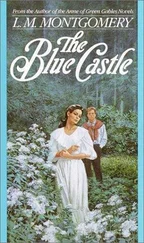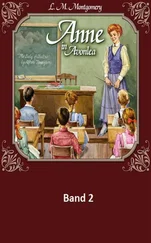One evening Harmon Andrews came in with a fresh budget of news.
"The Baxter business is pretty near wound up at last," he said, as he lighted his pipe. "Peter has got his lawsuits settled and has hushed up the talk about swindling, somehow. Trust him for slipping out of a scrape clean and clever. He don't seem to worry any, but Lige looks like a walking skeleton. Some folks pity him, but I say he should have kept the run of things better and not have trusted everything to Peter. I hear he's going out West in the Spring, to take up land in Alberta and try his hand at farming. Best thing he can do, I guess. Folks hereabouts have had enough of the Baxter breed. Newbridge will be well rid of them."
Sara, who had been sitting in the dark corner by the stove, suddenly stood up, letting the black cat slip from her lap to the floor. Mrs. Eben glanced at her apprehensively, for she was afraid the girl was going to break out in a tirade against the complacent Harmon.
But Sara only walked fiercely out of the kitchen, with a sound as if she were struggling for breath. In the hall she snatched a scarf from the wall, flung open the front door, and rushed down the lane in the chill, pure air of the autumn twilight. Her heart was throbbing with the pity she always felt for bruised and baited creatures.
On and on she went heedlessly, intent only on walking away her pain, over gray, brooding fields and winding slopes, and along the skirts of ruinous, dusky pine woods, curtained with fine spun purple gloom. Her dress brushed against the brittle grasses and sere ferns, and the moist night wind, loosed from wild places far away, blew her hair about her face.
At last she came to a little rustic gate, leading into a shadowy wood-lane. The gate was bound with willow withes, and, as Sara fumbled vainly at them with her chilled hands, a man's firm step came up behind her, and Lige Baxter's hand closed over her's.
"Oh, Lige!" she said, with something like a sob.
He opened the gate and drew her through. She left her hand in his, as they walked through the lane where lissome boughs of young saplings flicked against their heads, and the air was wildly sweet with the woodsy odors.
"It's a long while since I've seen you, Lige," Sara said at last.
Lige looked wistfully down at her through the gloom.
"Yes, it seems very long to me, Sara. But I didn't think you'd care to see me, after what you said last spring. And you know things have been going against me. People have said hard things. I've been unfortunate, Sara, and may be too easy-going, but I've been honest. Don't believe folks if they tell you I wasn't."
"Indeed, I never did—not for a minute!" fired Sara.
"I'm glad of that. I'm going away, later on. I felt bad enough when you refused to marry me, Sara; but it's well that you didn't. I'm man enough to be thankful my troubles don't fall on you."
Sara stopped and turned to him. Beyond them the lane opened into a field and a clear lake of crocus sky cast a dim light into the shadow where they stood. Above it was a new moon, like a gleaming silver scimitar. Sara saw it was over her left shoulder, and she saw Lige's face above her, tender and troubled.
"Lige," she said softly, "do you love me still?"
"You know I do," said Lige sadly.
That was all Sara wanted. With a quick movement she nestled into his arms, and laid her warm, tear-wet cheek against his cold one.
When the amazing rumor that Sara was going to marry Lige Baxter, and go out West with him, circulated through the Andrews clan, hands were lifted and heads were shaken. Mrs. Jonas puffed and panted up the hill to learn if it were true. She found Mrs. Eben stitching for dear life on an "Irish Chain" quilt, while Sara was sewing the diamonds on another "Rising Star" with a martyr-like expression on her face. Sara hated patchwork above everything else, but Mrs. Eben was mistress up to a certain point.
"You'll have to make that quilt, Sara Andrews. If you're going to live out on those prairies, you'll need piles of quilts, and you shall have them if I sew my fingers to the bone. But you'll have to help make them."
And Sara had to.
When Mrs. Jonas came, Mrs. Eben sent Sara off to the post-office to get her out of the way.
"I suppose it's true, this time?" said Mrs. Jonas.
"Yes, indeed," said Mrs. Eben briskly. "Sara is set on it. There is no use trying to move her—you know that—so I've just concluded to make the best of it. I'm no turn-coat. Lige Baxter is Lige Baxter still, neither more nor less. I've always said he's a fine young man, and I say so still. After all, he and Sara won't be any poorer than Eben and I were when we started out."
Mrs. Jonas heaved a sigh of relief.
"I'm real glad you take that view of it, Louisa. I'm not displeased, either, although Mrs. Harmon would take my head off if she heard me say so. I always liked Lige. But I must say I'm amazed, too, after the way Sara used to rail at him."
"Well, we might have expected it," said Mrs. Eben sagely. "It was always Sara's way. When any creature got sick or unfortunate she seemed to take it right into her heart. So you may say Lige Baxter's failure was a success after all."
Thyra Carewe was waiting for Chester to come home. She sat by the west window of the kitchen, looking out into the gathering of the shadows with the expectant immovability that characterized her. She never twitched or fidgeted. Into whatever she did she put the whole force of her nature. If it was sitting still, she sat still.
"A stone image would be twitchedly beside Thyra," said Mrs. Cynthia White, her neighbor across the lane. "It gets on my nerves, the way she sits at that window sometimes, with no more motion than a statue and her great eyes burning down the lane. When I read the commandment, 'Thou shalt have no other gods before me,' I declare I always think of Thyra. She worships that son of hers far ahead of her Creator. She'll be punished for it yet."
Mrs. White was watching Thyra now, knitting furiously, as she watched, in order to lose no time. Thyra's hands were folded idly in her lap. She had not moved a muscle since she sat down. Mrs. White complained it gave her the weeps.
"It doesn't seem natural to see a woman sit so still," she said. "Sometimes the thought comes to me, 'what if she's had a stroke, like her old Uncle Horatio, and is sitting there stone dead!'"
The evening was cold and autumnal. There was a fiery red spot out at sea, where the sun had set, and, above it, over a chill, clear, saffron sky, were reefs of purple-black clouds. The river, below the Carewe homestead, was livid. Beyond it, the sea was dark and brooding. It was an evening to make most people shiver and forebode an early winter; but Thyra loved it, as she loved all stern, harshly beautiful things. She would not light a lamp because it would blot out the savage grandeur of sea and sky. It was better to wait in the darkness until Chester came home.
He was late to-night. She thought he had been detained over-time at the harbor, but she was not anxious. He would come straight home to her as soon as his business was completed—of that she felt sure. Her thoughts went out along the bleak harbor road to meet him. She could see him plainly, coming with his free stride through the sandy hollows and over the windy hills, in the harsh, cold light of that forbidding sunset, strong and handsome in his comely youth, with her own deeply cleft chin and his father's dark gray, straightforward eyes. No other woman in Avonlea had a son like hers—her only one. In his brief absences she yearned after him with a maternal passion that had in it something of physical pain, so intense was it. She thought of Cynthia White, knitting across the road, with contemptuous pity. That woman had no son—nothing but pale-faced girls. Thyra had never wanted a daughter, but she pitied and despised all sonless women.
Читать дальше



